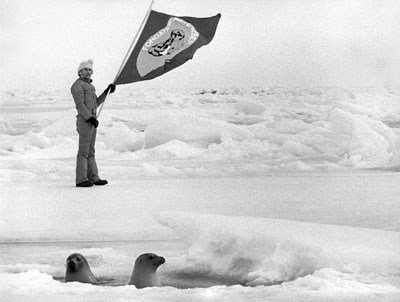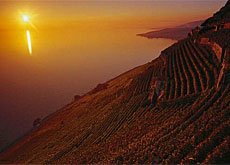Environmentalist Weber still strong at 80

Swiss environmentalist Franz Weber, who campaigned with French actress Brigitte Bardot against the slaughter of seals, celebrates his 80th birthday on Friday.
But the initiator of moves that led to the wine-growing Lavaux region in western Switzerland being given World Heritage status by Unesco, the United Nations cultural agency, has no thoughts about retirement.
“We have to leave something behind for our young people and descendants,” Weber said in a recent radio interview, explaining his commitment to the environment.
He doesn’t see himself as a fanatic. “No, I’m convinced about causes. I fight for nature and for immaterial values.” As a former journalist, Weber is not afraid of using dramatic words.
Weber was one of the first Swiss environmentalists to use direct democracy intensively.
In his campaign against over-construction and the overuse of land, he launched a record dozen people’s initiatives between 1973 and 2006.
Environment concerns
Weber’s environmental concerns are widespread, covering protection of the countryside and village centres, the fight against road construction and aircraft noise, saving forests and animal protection.
Apart from the 12 people’s initiatives at federal level, he has also been behind 15 cantonal initiatives – another record.
At the heart of his direct democracy activities is a databank of his Helvetia Nostra (Our Switzerland) organisation, which contains about 200,000 addresses.
“Franz Weber has always carried out very clear-cut projects and at the same time followed a holistic philosophy,” Philippe Roch, former head of what is now the Swiss Environment Agency, told swissinfo.
“I myself always worked together with organisations, because I find that we need organisations that encourage cooperation among people. But we also need personalities like Weber, who are freer.”
“Extraordinary person”
The deputy director of the Swiss Foundation for Protection of the Countryside, Richard Patthey, described Weber as an “extraordinary person”.
“He can also offend because he goes straight to the point and doesn’t beat about the bush. And that doesn’t make him particularly popular with politicians.”
Weber seems himself rather as a catalyst: “I can carry people along with me.”
But a former head of WWF Switzerland, Roland Wiederkehr, who was also a member of parliament, is a little more critical of Weber’s solo combat.
“His problem is that he doesn’t know how to share. To put it more concretely, he is a born leader, an alpha animal.”
Wiederkehr explained that those who had helped in teamwork had to be given a mention and this was not so easy for Weber.
Guru?
“As a result, it’s probably more difficult for him to work with men than with women, who see him as a guru and who don’t mind if they don’t get a mention.”
Although campaigner Weber is not tired of fighting, at 80 he has to deal with the issue of finding a successor. He is convinced that his wife and daughter will continue his life’s work.
Roch feels it is clear that his movement will change. “Weber is Weber and no one else can be Weber.”
Wiederkehr believes that strong characters like Weber or the Zurich pastor Ernst Sieber, who campaigns for the homeless, miss the boat when it comes to the succession question.
“But I do believe that what has been created will be carried on by his daughter. It will be more difficult, though, to start something new.”
Weber has no thoughts of giving up. “I have no time to give up. I have to hop around until I don’t have any more life in me,” he said not so long ago.
On his 80th birthday, he will be celebrating at the historic Hotel Giessbach near Brienz in the Bernese Oberland. It’s a hotel that he helped save from being torn down with the foundation “Giessbach for the Swiss People” and he also played a hand in restoring it to its former splendour.
swissinfo, Etienne Strebel
After the Second World War, Weber wanted to become a writer in Paris but he earned his living as a newspaper correspondent. His media experience helped him later in his environment campaigns.
Weber’s fight for the countryside and animals began in the middle of the 1960s in Surlej on the lake at Silvaplana in the Engadine valley.
The Franz Weber Foundation is active around the world in the protection of nature and animals.
These include initiatives against the unrestricted construction of second homes, against construction of buildings that are harmful to the environment or landscape and against the noise of fighter planes in tourist areas.
He also launched an initiative to save Swiss forests as well as campaigning to have the Lavaux region on Lake Geneva given World Heritage status by Unesco.
He’s also called for “democracy” in national road construction and helped rescue the Grand Hotel Giessbach above Lake Brienz in the Bernese Oberland.
Weber campaigned against the slaughter of seals in Canada with French actress Brigitte Bardot.
He initiated the International Court of Justice for Animal Rights in Geneva.
Weber fought to save the extraction of bauxite at Les Beaux de Provence in France.
He campaigned to stop modern construction in the small Italian Renaissance town of Asolo.
Weber fought against the shooting from helicopters of wild horses in Australia.
He led an international campaign called “Hands off ivory”.
His foundation has two large wild animal reserves in Australia and Africa.

In compliance with the JTI standards
More: SWI swissinfo.ch certified by the Journalism Trust Initiative











You can find an overview of ongoing debates with our journalists here . Please join us!
If you want to start a conversation about a topic raised in this article or want to report factual errors, email us at english@swissinfo.ch.